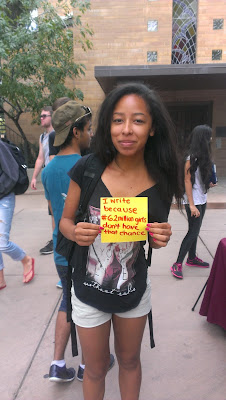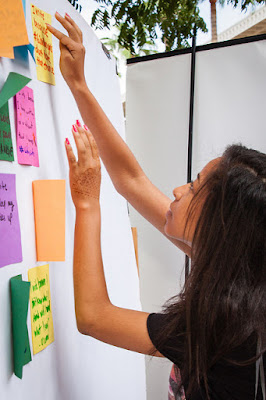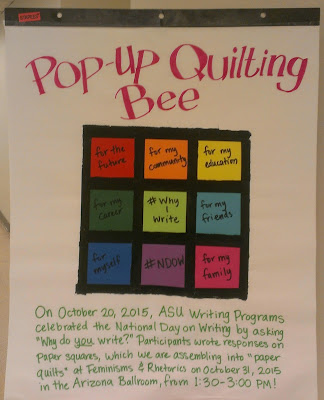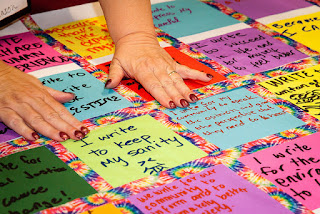I grew up in a deeply conservative household. Most of my family remains conservative or very conservative. I live in a very conservative state and work on a very conservative campus. Yet some years ago, during one of those wonderfully long conversations you have on road trips, my younger brother observed (in a bemused rather than a judgmental tone) that I was "kind of liberal." I laughed at the absurdity of it, because having just finished my first two years of graduate study, during which I had almost daily experienced direct or indirect disparagement of my conservative and especially my Christian values, I was keenly aware that by liberal standards, I was much more likely to be regarded as "kind of conservative." And so it remains.
It's true that I've moved to the middle, and am, at present, probably a bit left-of-center, whereas at the time of that conversation I was more right-of-center. I am, as my brother perceived before I did, "kind of liberal," and it turns out I kind of always have been. I did not experience my shift toward the political center as a shift away from my core values, but rather a more nuanced and self-determined understanding of their application in the world. What has most changed is that I no longer feel at home among conservatives; nor do I think I will ever really feel at home among liberals. Whereas the attacks on my perceived conservatism that I experience among liberals have been sly and insidious, the attacks on my perceived liberalism that I have experienced within my conservative community have been direct and vicious. As painful and exhausting as this frequently is for me, maybe this inability to belong, politically speaking, isn't entirely a bad thing.
This next paragraph is the only paragraph in which I'm going to mention the presidential candidates by name, and then I'm going to write instead about broader principles, because that's what I want to talk about right now--not which candidate was wronger, or more corrupt. I'm tired of that.
I've read a lot of statements this week to the effect that for democrats (or those who voted for Clinton, not all of whom are democrats), this election was about deeply moral issues, while for republicans, it was largely about the economy, or about preserving their way of life. Of course that's no more true than the inverse would be: that for republicans (or those who voted for Trump,not all of whom are republicans), this election was about deeply moral issues, while for those who voted for Clinton, it was about the economy, or about preserving their way of life. While it's probably true that for a lot of voters, this was about the economy, it's worth noting that regardless of their political ideology, most people believe economic issues
are moral issues (and they are), and obviously, so is preserving a way of life. It
may be true that some people did vote primarily out of self-interest, but I think that's as likely to be the case for liberals as for conservatives.
However, I've really only seen one side of this political divide argue that voting out of self-interest is at least potentially acceptable, and that's the liberal side. Liberals don't usually argue that
they vote out of self-interest. Rather they complain that their political foes are voting
against their own interests, and that they must really not understand the fact that they are doing so. The implicit argument is either that conservatives are inherently selfish, and/or that self-interest is a valid reason for political decision making. To the conservative mind it must follow that either liberals themselves vote not out of principle but out of self-interest, or that they regard conservatives with outright contempt.
Which is maybe why conservatives have scoffed at liberal moral outrage throughout this whole election cycle. And who can blame them? Liberals make regular sport of scoffing at conservatives' moral outrage, and justify it in turn because conservatives regard them as morally bankrupt. Let he who is without sin cast the first stone.
To be clear: I believe that liberals vote out of self-interest
no more than conservatives do, but also
no less (an assertion that is unlikely to win me friends on either side, so I'll just add that I include myself in this unflattering assessment). That is to say, of course people vote out of self-interest, whether consciously or unconsciously. But however rational a political argument from self-interest might be, or however necessary to healthy political life it might be that we analyze the ways that self-interest plays a role in political decision-making, as a persuasive tool for conservatives it is much worse than a non-starter.
Much has been written about the moral reasoning of liberals and conservatives. It is a truism that conservatives tend to think in terms of moral absolutes, whereas liberals tend to be more comfortable with
casuistic moral reasoning. To the degree that such a generalization is accurate, it should be obvious why accusing conservatives of voting against their own interests is sheer folly, if it is not malice.
I remember an argument, many years ago, between a cousin and another one of my brothers. This cousin could not understand why, given that both my parents are disabled, and this brother is himself disabled, my family tends to vote for politicians who promise to cut medicare, medicaid, and social security. How could it be logically or morally consistent to vote against the very programs on which my family depends just to get by from day to day? But it is absolutely logically and morally consistent to vote against such programs, even if you benefit from them, if you believe (as conservatives do, with a great deal of political philosophy behind them) that they are beyond the proper purview of government. For conservatives, what matters is voting for
what is good, not simply what is good
for them. Liberal readers will be quick to point out that this is what matters to them as well, and they'd be telling the truth, too. But to liberals (at least to white, middle- and upper-class ones), it often seems that only they have the moral courage to knowingly vote against their own self-interest; they have so much privilege to lose, and they are eager to lose it. We all see through a glass, darkly. Sometimes the glass is so dark it's more of a mirror than a window on the world.
But if conservatives don't believe in casuistic moral reasoning, what right had my parents to take government handouts which they believe it has no right to give? Pretty much the same right that a liberal who votes for strong gun control would have to shoot someone in the face to save the lives of their children. Put in less visceral terms, even the most ardent conservative can't completely avoid casuistic moral reasoning (and I don't believe that, if pressed, many of them would argue that they should), but they prefer a more clear-cut moral consistency. They would prefer a world in which people are free to keep more of their hard-earned money and choose how to bestow it charitably, rather than have the government take it and decide who deserves to have it, and how much, and for how long.
Having been welfare recipients since almost my earliest memory, my family knows better than most how precarious welfare is to rely on, and how unhealthy dependency on it is. The prospects of homelessness and hunger are terrifying, especially when thinking of your children. If a government is in control of your rent and your bread, you are at serious risk of being enslaved by it. A great many conservatives will tell you that this is why a majority of low-income and people of color vote democrat; they even call it "welfare slavery." Of course private charity can be precarious too, can foster unhealthy dependency too. And contrary to conservative protestations, private charity has never in recorded history been adequate on a widespread scale, which is why we have a social safety net in the first place. But given how well-versed liberals are in critiquing the mechanisms of power, is it really so hard to understand that government welfare is a twice-over exercise of alarming force? Is it really so hard to understand why conservatives who rely on it for survival would still vote to abolish it, not out of ignorance or foolishness but
as a matter of principle? Is that not exactly what liberals urge us to do by enacting policies that they argue are necessary to abolish systemic racism, sexism, etc.? Is it not more worthy of respect than ridicule? Alfred P. Doolittle was wrong, you see: you are never too poor to afford moral principles.
Ironically, liberal bewilderment at low- and middle-income conservatives "voting against their interests" also makes it hard for conservatives to take liberals seriously when they talk about "the Patriarchy." What is more patriarchal than the assumption that conservative voters do not really know what is good for them? What is more patriarchal than liberal policies which aim to expand dependence on government to provide for basic necessities, rather than affirming that responsibility to provide food, shelter, and health care belongs with individuals, families, and communities? How can it be morally and logically consistent to uphold the right of self-determination (which liberals seem to hold above almost all others) while denying that huge swaths of Americans are capable of exercising it responsibly on their own behalf?
Well, we liberals and "kind of liberals" would answer, it's also pretty hard to exercise self-determination when you're chronically sick and can't get health care; or when you don't have access to a shower and clean clothes and a car so that you can get and keep a job; or when you have to choose between being able to feed yourself and your kids or getting out of an abusive marriage. Expanding the social safety net isn't about expanding dependence on but about expanding
access to welfare, with the goal of helping people get back on their feet as quickly as possible, which we assume is what everyone involved wants.
Except it isn't necessarily what everyone wants--and I don't mean the debunked and extremely demeaning conservative myth of welfare queens and the undeserving poor. I mean the principle which both liberals and conservatives believe in: that people with power want to hold onto it. And if you put the power to
help people increasingly in the hands of government, it's not really in
government's interests for people to stop needing their help. There's a lot more power in giving than in receiving.
Conservatives, for their part, keep voting in ways that put us all ever more at the mercy of the ultra-rich, who are no less likely to do everything in their already terrifyingly considerable power to hold onto it, who are not answerable to the electorate, and who keep on amassing to themselves a greater and greater share of our nation's wealth, which is our only means of "voting" against them by refusing to buy what they're selling. But since most of their wealth now is self-generating via financial market manipulation, and since government demonstrated after the crash of 2008 that it has no interest in curbing their power to continue manipulating said markets, we're all basically screwed anyway, and that, dear readers, is another thing that conservatives and liberals basically agree about. Alas, it's also one of the many things we seem incapable of agreeing about how to solve.
I've offered a handful of examples of liberals and conservatives arguing from principles (some of them the very same principles) to reach very different conclusions, both of which are (sometimes, sometimes not) based on facts as well as moral reasoning. I assure you, I could offer more, but a thorough enumeration isn't my goal. My goal was to prove to myself, if not to the few people who occasionally read my blog, that it really is possible to find common ground between liberals and conservatives, on
principles if not on
policies. That ground is where I try to live.
I don't offer any solutions. Perhaps I ought to try, but I don't know what they are, and right now I'm too tired from having to defend my moral principles and my political choices from every direction. A lot of people seem to think that being moderate (like voting third-party) is a cop out, the most morally inconsistent position of all. Maybe sometimes it is. But it's also really hard. It's lonely. At least in the trenches you have lots of comrades to guard your back. It's pretty exposed out here in no-man's-land, and this war doesn't seem close to a cease-fire anytime soon.
So I'll just end this post with a meme that's been making the rounds recently among both my liberal and my conservative social networks. I don't know where the image came from; I wasn't able to track it to its source, but if anyone can point me to it, I'd love to give proper credit.















